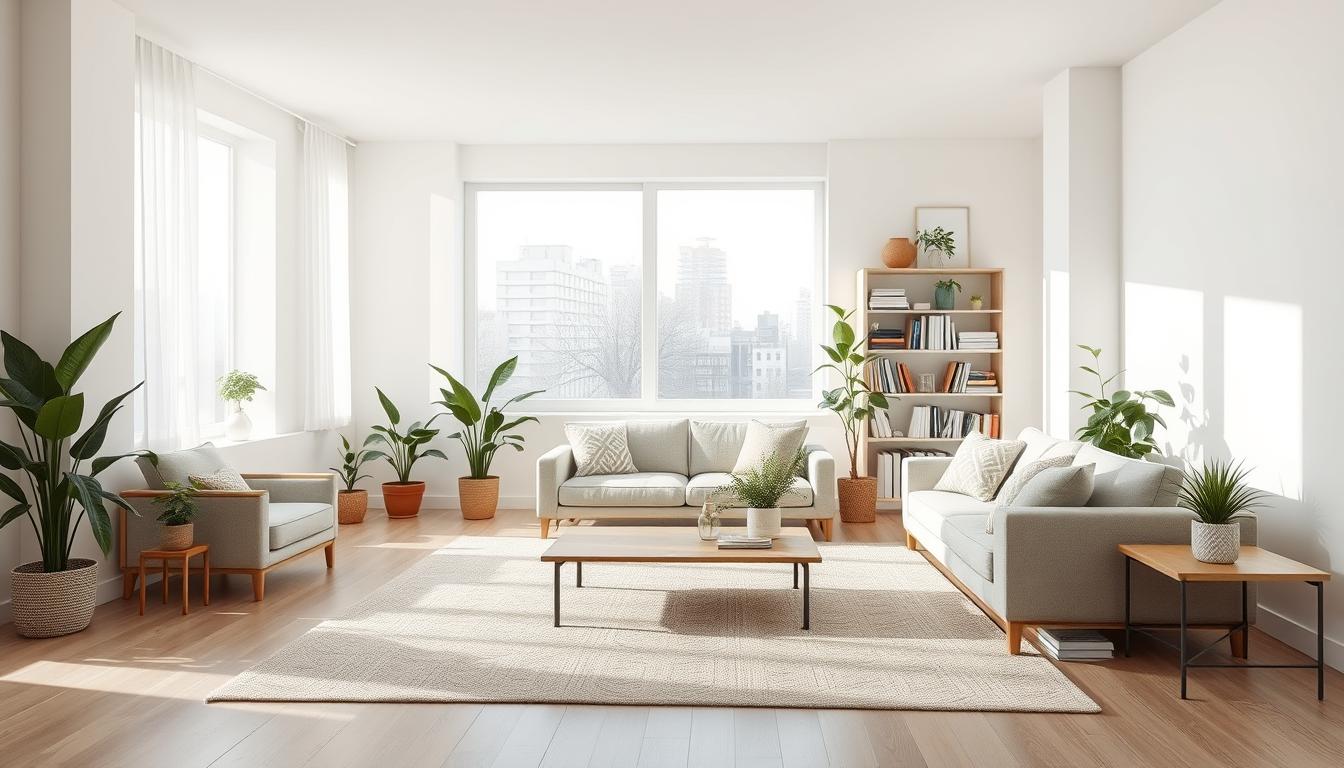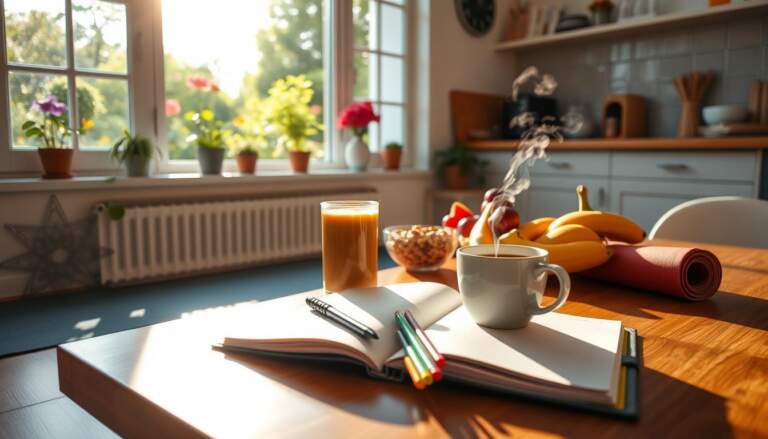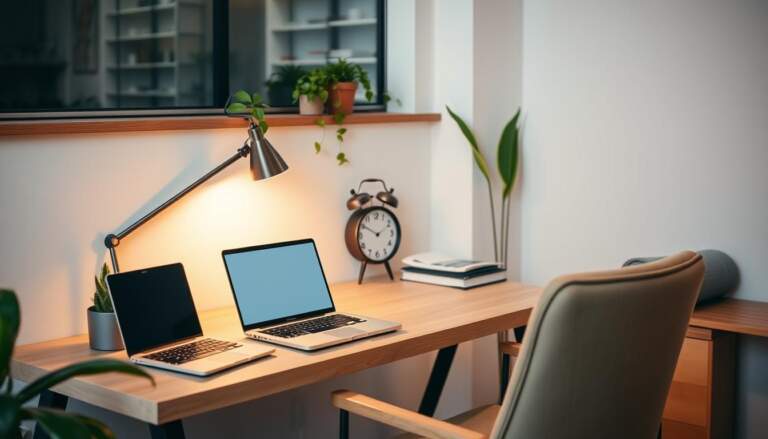Embarking on the path to a clutter-free lifestyle starts with embracing the transformative power of minimalist living. For many, the epiphany comes when they recognize the burden of possessions and the lack of joy that often accompanies excess. By adopting decluttering tips focused on life simplification, individuals can take definitive steps towards stress reduction and serene living, ultimately cultivating an organized home that fosters peace and productivity.
The avoidance of decluttering is frequently attributed to a lack of clarity, confidence, and belief in the value of the effort—all of which are crucial to the success of a minimalist transition1. With the right motivation and a methodical approach to downsizing possessions — focusing on distinct aspects of life such as digital presence, clothing collections, and personal priorities each month — the journey toward a clutter-free lifestyle becomes not only achievable but also enjoyable2.
Indeed, the process is not about relinquishing treasures, but rather about identifying what truly matters. The wisdom of a couple who adopted consistency over intensity in their decluttering routine proves that dedicating just minutes per day can manifest significant change1. Their experience underscores the importance of immediate action, setting pragmatic goals, and appreciating the progress made towards minimalist living1.
Key Takeaways
- Recognize the drivers of clutter and overcome them for a successful decluttering journey1.
- Embrace minimalist living to increase home organization and reduce mental stress2.
- Practice consistent decluttering efforts for long-term life simplification1.
- Keep the decluttering process motivational with visual progress tracking1.
- Start small to achieve a serene living space and efficient lifestyle2.
Understanding the Impact of Clutter on Well-being
The spaces we inhabit deeply influence our mental health and productivity. Clutter, often overlooked, plays a significant role in shaping our day-to-day experiences and overall well-being by creating visual distractions that contribute to mental stress and reducing the efficiency of our interactions with our environment. This section delves into the varied impacts of clutter and outlines effective strategies to cultivate an uncluttered, peaceful home environment that encourages better time management and financial savings.
Visual Distraction and Mental Stress
Living amidst clutter can significantly boost stress and anxiety levels. The presence of over 2,000 visible objects in an average room can lead to feelings of overstimulation and anxiety3. This visual distraction disrupts focus and is linked to decreased productivity and lower well-being. Studies further show that clutter contributes to feelings of overwhelm, affecting life satisfaction adversely3. A cluttered space is not just a physical issue but a considerable psychological hurdle impacting everyday mood and mental health.
The Efficiency of an Uncluttered Space
An uncluttered space is synonymous with optimized efficiency. Research indicates that reducing clutter can significantly enhance focus and productivity by minimizing the visual distractions that clutter presents4. This clean environment fosters a space where creativity and efficiency thrive, facilitating better job performance and personal satisfaction. Additionally, an organized space saves time usually lost in searching for misplaced items, thereby improving overall time management.
Creating a Peaceful Home Environment
The transformation of a cluttered garage into a functional area like a home gym or a dedicated parking spot exemplifies financial savings and the creation of a peaceful environment through decluttering3. By simplifying living spaces, one not only enhances the home’s aesthetic appeal but also invites tranquility, enabling relaxation and a stress-free space conducive to mental health and well-being.
Financial and Time Savings with Less Clutter
Clutter not only consumes physical space but also results in financial burdens associated with the acquisition and storage of unnecessary items. Decluttering can evade these costs, providing savings in terms of both money and time spent managing possessions3. In fact, decluttering reduces the risk of purchasing duplicate items and the costs related to maintaining excess belongings. Moreover, an organized environment supports faster decision-making and efficient daily routines, promoting effective time management.
Implementing structured decluttering practices can also alleviate the mental load that a cluttered space imposes. Starting small, focusing on one area at a time, and seeking help from friends or professional organizers can transform an overwhelming task into an achievable goal, reducing stress and enhancing personal efficiency4.
| Impact | Benefits |
|---|---|
| Reduced Visual Distraction | Increased focus and reduced mental stress |
| Uncluttered Space | Enhanced productivity and creativity |
| Financial Savings | Decreased expenses on unnecessary items |
| Time Management | Faster decision-making and efficient daily routines |
Beginning Your Decluttering Journey
The first step in transforming your home into a bastion of tranquility involves diving into the decluttering process by setting clear, manageable goals. Research suggests that establishing time frames for decluttering each room can significantly mitigate feelings of burnout and frustration5. By simplifying possessions gradually, whether dedicating 10 minutes a day or a larger chunk of time each week to organization, you can maintain momentum without feeling overwhelmed5.
When starting declutter, consider the KonMari method, which focuses on keeping items that spark joy rather than simply discarding unwanted goods. This approach encourages gratitude, leading to more conscious decision-making while simplifying possessions5. Moreover, creating designated spaces for frequently used items can stave off future clutter, maintaining the clarity of your environment after the initial decluttering steps5.
“A clutter-free space isn’t just about aesthetics; it enhances your productivity and mental clarity.” – Experts on organization.
Key strategies, such as vertical storage and labeling possessions, improve efficiency and ease of finding items5. Additionally, adopting limits on incoming items helps manage clutter sustainably by preventing over-accumulation5. Finally, make it a ritual to declutter your environment at least once a year with more frequent mini declutters to maintain an organized, peaceful living space6.
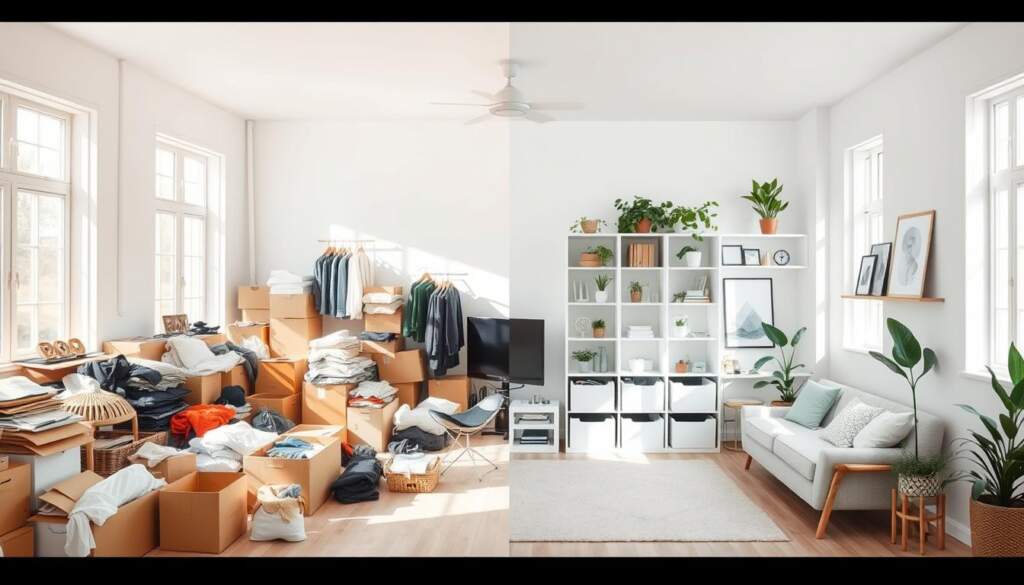

- Assess the need for new items carefully; delay purchases to ensure they are necessary5.
- Utilize tools like markers for labeling and storage containers to aid in clutter elimination5.
- Place donated or discarded items immediately in your car’s trunk for quick delivery to donation centers, preventing re-clutter5.
As you work through the clutter, each cleared area can instill a sense of achievement and motivation, highlighting the positive impact of clutter elimination on both mental well-being and productivity5. Remember, the goal of decluttering isn’t just about removing things but about creating a joyous and functional living space. Happy decluttering!
Developing a Personalized Decluttering Strategy
To embark on a journey of personalized decluttering, it’s essential to begin with a solid plan that catifies both your physical space and your peace of mind. The key is to craft a strategy that feels uniquely tailored to your lifestyle, ensuring that each step towards decluttering not only clears your space but also brings joy and functionality back into your daily routine.
Setting Achievable Decluttering Goals
Starting with achievable goals forms the cornerstone of an effective decluttering strategy. Looking at the overwhelming amount of items to declutter might seem daunting, which is why breaking down the task into smaller, manageable parts is crucial. Focus on setting clear targets, such as dedicating a weekend to sorting through piled-up mail or scheduling a day to tackle the overflowing drawer of old makeup, 87% of which is kept despite never being used7. This method ensures progress without the task becoming overwhelming.
Importance of Consistent Effort Over Intensity
Consistency over intensity is vital in maintaining momentum throughout your decluttering process. A little effort each day contributes more to achieving a tidy home than sporadic, intense decluttering sessions which can lead to burnout. As suggested by8, dedicating just 15 to 30 minutes daily towards organizing your space can lead to significant improvements over time, creating a habit that fosters long-term results.
Leveraging Visual Progress Tracking
Using progress tracking is a motivating way to visualize the strides you’ve made in reclaiming your space. Employ printable trackers or a digital app to note down each completed task. This visual representation of your accomplishments reinforces the positive impact of your efforts, ensuring you stay engaged and motivated throughout your decluttering journey.
Starting with Smaller Tasks for Bigger Success
Employing a small task strategy can significantly boost your decluttering success. Begin with simpler areas—like a single shelf or drawer—which provide immediate results and build your confidence. Statistics reveal that tackling smaller cluttered areas, such as sorting through old receipts or discarding unused and tarnished jewelry, can collectively lead to a major reduction in household clutter, with 95% of people tending to hoard old receipts7 and about 70% keeping old and unmatched jewelry7.
| Category | Percentage (%) | Impact on Decluttering |
|---|---|---|
| Old Makeup | 87 | Reduces visual clutter |
| Receipts & Manuals | 95 | Clears up significant drawer space |
| Unused Jewelry | 70 | Enhances wardrobe functionality |
By adopting these personalized and actionable steps, the daunting task of decluttering transforms into an achievable, enjoyable process. Each step fosters a stronger sense of control and accomplishment, propelling you towards a clutter-free home that feels both organized and personalized.
How to Declutter Your Home and Simplify Your Life
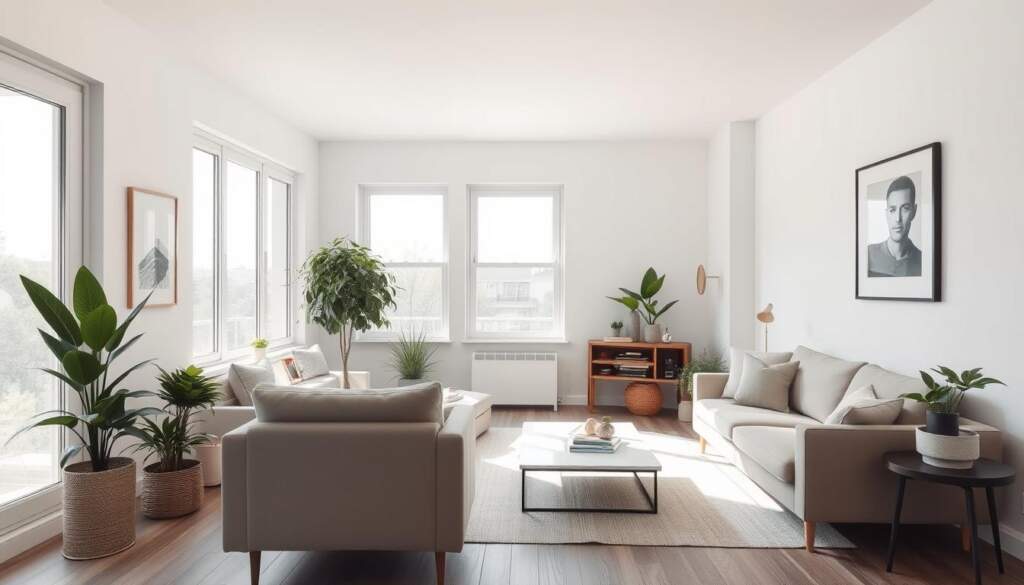

Embracing the principles of home decluttering and life simplification is more than just a trend; it’s a transformative lifestyle choice that promotes clutter-free living and intentional living. By incorporating rules like the 80/20 and 12/12/12 in our daily routines, we can significantly enhance our living space and mental well-being. According to the 80/20 rule, most individuals utilize only 20% of their belongings 80% of the time, indicating that a vast majority of items are potentially unnecessary9.
The 12/12/12 rule further simplifies the decluttering process by encouraging us to find 12 items to discard, 12 to donate, and 12 to return to their proper places, effectively organizing our space and aiding in stress reduction9. Implementing this rule could potentially streamline your living environment, making it a minimalist home that focuses on the essentials. Such an approach not only reduces physical clutter but also diminishes mental clutter, leading to a clearer mind and a more focused life.
- Decluttering Benefits: Enhanced focus, increased productivity, and stress reduction.
- Strategies: Utilize quick decluttering methods and sorting categories to maintain intentionality in your space.
- Outcome: A serene, clutter-free environment that embodies the essence of minimalist living.
In addition to freeing up physical space, decluttering can also provide financial relief, especially for the 59% of American households navigating through paycheck to paycheck cycles. Removing unnecessary expenditures on rarely used items can contribute to more financial freedom and a reduced burden of possessions10. This shift towards intentional living invites us to rethink our consumption habits, leading to more mindful, purposeful purchasing and living habits.
Finally, by engaging in minimalist home practices, you’re not just simplifying space but also promoting a culture of giving and sharing. Donating items not only helps declutter your space but also supports those in need, creating a cycle of generosity and simplicity. Following the 12/12/12 rule, you might find decluttering as a way to simplify your life while benefiting others, a true reflection of intentionality in action9.
Practical Tips for Reducing Clutter in Your Home
Embarking on a journey to reduce clutter not only enhances the aesthetics of your living space but also improves overall well-being and productivity. Tackling clutter can be overwhelming, which is why breaking it down into manageable steps is crucial. Here are some valuable pointers to help you achieve a decluttered and organized home.
Identifying What to Keep and What to Let Go
Start by assessing each item’s value and functionality. If something hasn’t been used for a year or more, it might be time to say goodbye. This process can dramatically reduce stress levels and increase your home’s manageability and cleanliness11.
Revolutionizing Your Closet with Minimalism
Embrace closet minimalism by adopting a capsule wardrobe, which simplifies deciding what to wear each day. This approach involves selecting versatile pieces that mix and match well, reducing the need to own excessive clothing items. By following this method, you can revolutionize your daily routine and embrace a minimalist lifestyle11.
Digitally Decluttering Your Life
Digital decluttering is as crucial as physical tidy-ups. Start by organizing digital files and unsubscribing from unnecessary emails. Digital decluttering not only clears your virtual space but also enhances focus and productivity by minimizing distractions related to digital clutter11.
Making Decluttering a Group Activity for Better Results
Inviting friends or family to join your decluttering efforts can make the process enjoyable and more efficient. Group decluttering activities foster a sense of community and support, making the task less daunting. Additionally, collective efforts often lead to quick and significant results, providing immediate satisfaction and motivation to maintain a clutter-free environment11.
For further insights and tips on embarking on your decluttering journey, consider subscribing to our newsletter at Quick Pop Viral for regular updates and guidance.
| Area | Tips | Benefits |
|---|---|---|
| Closet | Adopt a capsule wardrobe | Reduces decision fatigue, promotes closet minimalism11 |
| Digital | Unsubscribe from unused email lists, organize files | Increases focus and reduces digital clutter11 |
| Group Activities | Organize decluttering sessions with friends or family | Enhances efficiency and enjoyment11 |
Maintaining a Simplified Lifestyle
The journey of sustaining minimalism and maintaining a simplified lifestyle requires continuous effort and adaptable strategies. Daily decluttering routines set a positive tone and establish a foundation for a clutter-free, organized, and serene living environment. Tackling small cluttered areas for just five minutes each day can markedly reduce mental clutter and diminish feelings of overwhelm. To amplify these benefits, making the bed each morning is a powerful habit that fosters a sense of accomplishment and sets a positive start to the day. Additionally, spending a few minutes each evening tidying up common areas in the home enhances focus, productivity, and, crucially, contributes to improved sleep and peace of mind12.
When considering the immense scope of possessions typical in U.S. households, with an average of 300,000 items, the call for ongoing decluttering becomes even more pressing13. Lifestyle maintenance through simplification practices involves not only reducing the number of items but also maintaining an orderly space. This ongoing process includes handling items immediately rather than delaying tasks, which is a proactive step to prevent clutter from accumulating12.
To support a minimalist lifestyle consistently, the shift from acquiring new items should focus on the functionality and necessity of possessions. The decluttering process can be eased by adopting the ‘one in, one out’ rule and engaging communities or family members for support, which not only facilitates reducing clutter but also enhances the shared experience and accountability during the simplification journey13.
Furthermore, embracing minimalism isn’t just about decluttering but also about refining lifestyle choices that mesh with a decluttered environment. This might include choosing simplified decor, organizing belongings to prioritize clear surfaces, and incorporating functional furniture that enhances the utility and aesthetic of living spaces13. Continuing this approach, establishing quick, everyday cleanup routines can significantly aid in sustaining a clutter-free and pleasant home ambiance.
Ultimately, the adoption of minimalism and the practice of regular, ongoing decluttering foster not only a physically tidy environment but also promote a mentally and emotionally satisfying space. It’s a vital step towards lifestyle maintenance that encourages living with less, yet enjoying more quality and fulfillment in life.
Conclusion
As we draw the curtains on this comprehensive guide to decluttering and embracing a more minimalist lifestyle, the overwhelming sentiment is clear— embracing simplicity enriches life in ways beyond mere aesthetics. An astonishing 85% of people have felt overwhelmed by the clutter in their homes14, and the journey towards peaceful living is not just about clearing spaces, but about creating an environment that nurtures the soul. With 70% of individuals experiencing a sense of liberation post-decluttering14, the decluttering benefits span the spectrum from increased mental well-being to enhanced creativity15.
The notion of a minimalist transformation is no fleeting trend but a poignant response to the complex, high-speed world we navigate daily. Figures show that 65% of people believe in the well-being benefits of a minimalist mindset14; this speaks volumes about the conscious shift towards intentional living. Even famed organizing consultant Marie Kondo emphasizes that surrounding ourselves with items that spark joy is central to maintaining a decluttered home16. Moreover, 80% of individuals recognize the imperative nature of regular maintenance to stave off clutter14. It reveals a collective understanding of the perpetual effort needed to sustain decluttered spaces, echoing practices like the “one in, one out” rule, which aids in keeping acquisitions in check and clutter at bay15.
Finally, the path to achieving and holding onto a decluttered and simplified lifestyle may come with challenges, such as letting go of items linked with guilt or nostalgia, as expressed by 40% of individuals14. But the result—a space that resonates with peace and clarity—makes the endeavor worthwhile. Adopting small, actionable strategies like “the three-box method” or leveraging apps for simplifying and organizing can replace the feeling of overwhelm with control and purpose1516. Thus, as we realize the profound impact of decluttering on our peace of mind and quality of life, let us stride confidently towards a future marked by simplicity, serenity, and a sustained connection with the essentials that truly matter.
FAQ
What are some effective decluttering tips to begin simplifying my home?
How can clutter impact my well-being?
What are the benefits of living in an uncluttered space?
What initial steps should I take when starting the decluttering process?
How can I develop a personalized decluttering strategy?
How can embracing minimalist living assist with stress reduction and life simplification?
How do I decide what to keep and what to discard when decluttering?
What are some practical ways to revolutionize my closet with minimalism?
How can I digitally declutter my life?
What are the keys to maintaining a simplified lifestyle?
Source Links
- How to Systematically Declutter Your Life – https://www.becomingminimalist.com/how-to-systematically-declutter-your-life/
- Living Simply: The Ultimate Guide to Conquering Your Clutter – zen habits – https://zenhabits.net/living-simply-the-ultimate-guide-to-conquering-your-clutter/
- The Clutter-Depression-Anxiety Cycle: How to Stop It – nourishing minimalism – https://nourishingminimalism.com/clutter-depression-and-anxiety-a-vicious-cycle/
- Clutter and Stress: Why Clutter Stresses Us Out – https://balancethroughsimplicity.com/clutter-and-stress/
- How to Simplify Your Life By Decluttering and Organizing – https://www.wendaful.com/2019/01/how-to-simplify-your-life-by-declutting-and-organizing/
- Simple Life: De-Cluttering Your Home, Mind, & Life – https://kissexpedition.com/simple-life-de-cluttering-your-home-mind-life/
- How To Simplify Your Life By Decluttering – https://amyhatescarrots.com/how-to-simplify-your-life-by-decluttering
- My 5-Step Method to Declutter and Organize Your Home | Design Services LTD – https://www.designservicesltd.com/2024/02/22/my-5-step-method-to-declutter-and-organize-your-home/
- How to Declutter Your Home: 6 Best Room-by-Room Methods – https://www.thespruce.com/how-to-declutter-your-home-2648002
- How to Declutter Your Home: 10 Creative Decluttering Tips – https://www.becomingminimalist.com/creative-ways-to-declutter/
- Decluttering Your Life: 32 Practical Tips – https://balancethroughsimplicity.com/declutter-your-life/
- Simple Daily Habits to Declutter and Simplify Your Life | Design Services LTD – https://www.designservicesltd.com/2024/09/06/simple-daily-habits-to-declutter-and-simplify-your-life/
- 10 Minimalist Tips To Help You Simplify Your Home – https://bemorewithless.com/simplify-your-home/
- How to Simplify Decluttering Your Home – https://kathleenscleaningservice.com/5-easy-steps-to-declutter-and-simplify-your-home/
- The Art of Decluttering: Simplify Your Life and Space – Trustworthy Cleaning Services – https://trustworthycleaningserv.com/the-art-of-decluttering-simplify-your-life-and-space/
- Declutter Your Life: 5 Practical Ways to Simplify Before the New Year – https://dhwblog.dukehealth.org/declutter-your-life-5-ways-to-simplify-before-the-new-year/

